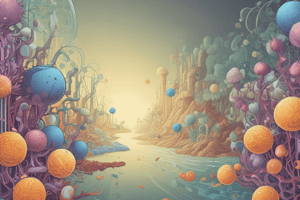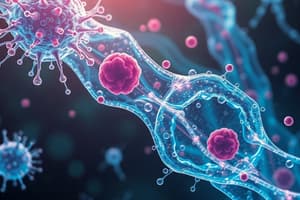Podcast
Questions and Answers
Which science deals with the study of microorganisms and their activities?
Which science deals with the study of microorganisms and their activities?
- Microbiology (correct)
- Chemistry
- Botany
- Zoology
Why were microorganisms initially placed in either the plant or animal kingdom?
Why were microorganisms initially placed in either the plant or animal kingdom?
- Due to their ability to photosynthesize like plants
- Because they possess both plant-like and animal-like characteristics (correct)
- Based on their size relative to plants and animals
- Because they have complex cellular structures like animals
Why are viruses not included in the kingdom Protista?
Why are viruses not included in the kingdom Protista?
- Because they are not technically alive (correct)
- Due to their ability to photosynthesize
- Because they do not have any structural differences
- Because they lack asexual reproduction methods
How are microorganisms grouped based on their morphology and functional properties?
How are microorganisms grouped based on their morphology and functional properties?
What is the main difference between a cell and an organelle?
What is the main difference between a cell and an organelle?
What is nucleoplasm and where is it found?
What is nucleoplasm and where is it found?
Who is credited with the introduction of live vaccines like chicken cholera bacillus?
Who is credited with the introduction of live vaccines like chicken cholera bacillus?
What did Robert Hooke contribute to microbiology?
What did Robert Hooke contribute to microbiology?
What structures characterize eukaryotic cells that are not present in prokaryotic cells?
What structures characterize eukaryotic cells that are not present in prokaryotic cells?
What does medical microbiology focus on?
What does medical microbiology focus on?
All microorganisms are alike and share the same features.
All microorganisms are alike and share the same features.
Viruses are included in the kingdom Protista proposed by Ernst Haeckel.
Viruses are included in the kingdom Protista proposed by Ernst Haeckel.
Microorganisms were initially classified into three kingdoms: Plant Kingdom, Animal Kingdom, and Protista Kingdom.
Microorganisms were initially classified into three kingdoms: Plant Kingdom, Animal Kingdom, and Protista Kingdom.
The kingdom Protista further divides microorganisms based on their functional properties.
The kingdom Protista further divides microorganisms based on their functional properties.
Prokaryotes have circular chromosomes, unlike eukaryotes.
Prokaryotes have circular chromosomes, unlike eukaryotes.
Organelles in prokaryotes are membrane-bound structures.
Organelles in prokaryotes are membrane-bound structures.
Cell walls in prokaryotes are very simple compared to eukaryotes.
Cell walls in prokaryotes are very simple compared to eukaryotes.
Nucleoplasm is a solid structure that contains chromosomes and nucleoli.
Nucleoplasm is a solid structure that contains chromosomes and nucleoli.
Medical microbiology focuses solely on the prevention of disease.
Medical microbiology focuses solely on the prevention of disease.
Antonie van Leeuwenhoek's instrument had a magnification of 400-500x.
Antonie van Leeuwenhoek's instrument had a magnification of 400-500x.
Flashcards
Microbiology
Microbiology
The scientific study of microorganisms and their roles in ecosystems.
Microorganism classification
Microorganism classification
Grouping microorganisms by shape, structure, and functions.
Virus vs. Protista
Virus vs. Protista
Viruses lack cell structure & metabolism, thus excluded from Protista.
Cell vs. Organelle
Cell vs. Organelle
Signup and view all the flashcards
Nucleoplasm
Nucleoplasm
Signup and view all the flashcards
Louis Pasteur
Louis Pasteur
Signup and view all the flashcards
Robert Hooke
Robert Hooke
Signup and view all the flashcards
Eukaryotic cell
Eukaryotic cell
Signup and view all the flashcards
Prokaryotic Organelles
Prokaryotic Organelles
Signup and view all the flashcards
Medical Microbiology
Medical Microbiology
Signup and view all the flashcards
Prokaryotic chromosome
Prokaryotic chromosome
Signup and view all the flashcards
Eukaryotic chromosome
Eukaryotic chromosome
Signup and view all the flashcards
Microorganism diversity
Microorganism diversity
Signup and view all the flashcards
Prokaryotic cell wall
Prokaryotic cell wall
Signup and view all the flashcards
Antonie van Leeuwenhoek
Antonie van Leeuwenhoek
Signup and view all the flashcards
Microbial Diversity
Microbial Diversity
Signup and view all the flashcards
Microscopy
Microscopy
Signup and view all the flashcards
Microbial Key Features
Microbial Key Features
Signup and view all the flashcards
Study Notes
Microbiology Overview
- Microbiology is the scientific study of microorganisms and their various functions and roles in ecosystems.
- Microorganisms were initially classified in the plant or animal kingdom due to their similarities to these larger life forms.
Viruses and Protista Kingdom
- Viruses are typically not included in the kingdom Protista because they lack cellular structure and metabolism, characteristics essential for classification as living organisms.
Classification of Microorganisms
- Microorganisms are grouped based on morphology (shape and structure) and functional properties, which help differentiate them into various categories.
Cells vs. Organelles
- A cell is the basic unit of life, capable of functioning independently, while an organelle is a specialized subunit within a cell that performs specific functions.
Nucleoplasm
- Nucleoplasm is a gel-like substance found within the nucleus of eukaryotic cells, serving as a medium for the chromatin and nucleoli.
Contributions to Microbiology
- Louis Pasteur introduced live vaccines, notably the chicken cholera bacillus, which laid foundations for immunology.
- Robert Hooke is recognized for his early observations that led to the identification of cells.
Characteristics of Eukaryotic Cells
- Eukaryotic cells have structures such as a true nucleus, membrane-bound organelles, and complex organization, which are absent in prokaryotic cells.
Focus of Medical Microbiology
- Medical microbiology aims to understand, prevent, and treat infectious diseases caused by microorganisms.
Key Differences in Microorganisms
- All microorganisms do share basic features but exhibit considerable diversity in function and structure; this diversity is essential for their roles in various ecosystems.
- Prokaryotes possess circular chromosomes, whereas eukaryotes have linear chromosomes contained within a nucleus.
- Prokaryotic organelles are not membrane-bound, contrasting with the membrane-bound organelles found in eukaryotes.
- Cell walls in prokaryotes are generally simpler in structure compared to those in eukaryotic cells.
Instrumentation in Microbiology
- Antonie van Leeuwenhoek developed a microscope capable of magnification between 400-500x, advancing the field of microbiology significantly.
Studying That Suits You
Use AI to generate personalized quizzes and flashcards to suit your learning preferences.
Description
Learn about the science of microbiology which deals with the study of microorganisms and their activities. Understand how microorganisms are grouped based on morphology and functional properties such as bacteria, fungi, algae, protozoa, and viruses.




